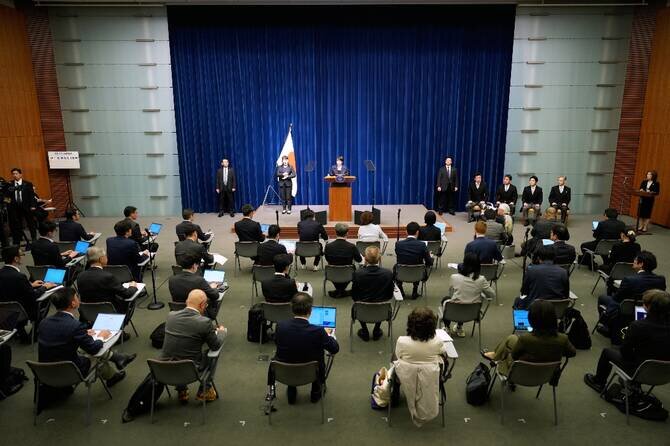
False Claim of 'Mass Deportations' Ministry in Japan Spreads Online
Misinformation about Japan's new immigration policies has gained traction on social media.
TOKYO: False claims that Japan’s new Prime Minister Sanae Takaichi has created a ministry for ‘mass deportations’ have circulated widely online, particularly in English-speaking forums.
These misstatements gained momentum after her election earlier this year, with the success of her party sparking concerns over immigration policy.
The false narratives on platforms like X and Facebook suggest that Takaichi appointed Kimi Onoda to lead such a ministry.
In reality, Onoda was named to serve as the economic security minister and the minister responsible for promoting harmonious coexistence between foreign nationals and society.
A similar department existed under the tenure of former Prime Minister Shigeru Ishiba, though this is the first time it has been supervised by a cabinet member.
In a press conference following her appointment, Onoda addressed concerns regarding immigration: "Japan will strictly handle foreign nationals who do not follow the rules".
She highlighted issues such as criminal activity and rule-breaking by some foreign residents that have caused anxiety among Japanese citizens.
Despite Japan’s relatively low immigration levels compared to other developed economies, demographic pressures like an aging population, low birth rates, and labor shortages across various sectors are leading to a gradual increase in immigrant numbers.
This issue resonated during the Liberal Democratic Party leadership race, which Takaichi won before becoming Prime Minister, as well as in her hometown of Nara, where she accused foreigners of disturbing deer.
The misinformation has not been limited to English; similar false claims have circulated in Thai, German, and Spanish, reflecting a broader reach.
This trend follows several incidents, such as the cancellation of a cultural exchange program with African nations due to misunderstanding, and complaints about school lunches perceived as Muslim-friendly in Kitakyushu city.
The proliferation of these falsehoods underscores growing concerns over immigration policies, echoing themes seen in populist movements globally that criticize ‘elitism’ and ‘globalism,’ seeking to reclaim power for the common people.
The anti-immigrant Sanseito party’s success in recent elections further highlights public unease with these issues.
These misstatements gained momentum after her election earlier this year, with the success of her party sparking concerns over immigration policy.
The false narratives on platforms like X and Facebook suggest that Takaichi appointed Kimi Onoda to lead such a ministry.
In reality, Onoda was named to serve as the economic security minister and the minister responsible for promoting harmonious coexistence between foreign nationals and society.
A similar department existed under the tenure of former Prime Minister Shigeru Ishiba, though this is the first time it has been supervised by a cabinet member.
In a press conference following her appointment, Onoda addressed concerns regarding immigration: "Japan will strictly handle foreign nationals who do not follow the rules".
She highlighted issues such as criminal activity and rule-breaking by some foreign residents that have caused anxiety among Japanese citizens.
Despite Japan’s relatively low immigration levels compared to other developed economies, demographic pressures like an aging population, low birth rates, and labor shortages across various sectors are leading to a gradual increase in immigrant numbers.
This issue resonated during the Liberal Democratic Party leadership race, which Takaichi won before becoming Prime Minister, as well as in her hometown of Nara, where she accused foreigners of disturbing deer.
The misinformation has not been limited to English; similar false claims have circulated in Thai, German, and Spanish, reflecting a broader reach.
This trend follows several incidents, such as the cancellation of a cultural exchange program with African nations due to misunderstanding, and complaints about school lunches perceived as Muslim-friendly in Kitakyushu city.
The proliferation of these falsehoods underscores growing concerns over immigration policies, echoing themes seen in populist movements globally that criticize ‘elitism’ and ‘globalism,’ seeking to reclaim power for the common people.
The anti-immigrant Sanseito party’s success in recent elections further highlights public unease with these issues.











